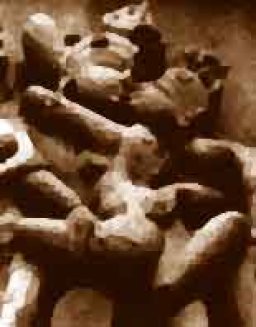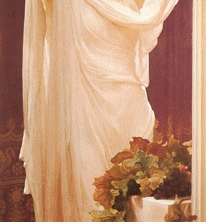
Sacred Sexuality Hinduism Neo-Paganism Buddhism
Buy books about Tantra

|
Tantra |
These texts describe the esoteric teachings of Tantra, a belief system which originated in India, praticed by a small number of Hindus and Buddhists. Tantra has become a synonym in the West for unbridled sexuality; however sexuality per se is only one facet of this elaborate spiritual practice, as a representation of the union of the soul with the Goddess. Rather, this attitude reflects the spiritual vacuum of mainstream Western religions when it comes to sacred sexuality. A deep study of Tantra can take a lifetime, and is not for the undisciplined or the thrill-seeker.
Tantra does not advocate an epicurian or libertine philosophy. Quite the contrary, the practices which involve behavior which is regarded by conventional Hinduism as 'sinful' (such as eating meat, drinking alcohol, and having sexual union), normally requiring expatiatory behavior, are supposed to only be engaged in by spiritually advanced practicioners in the appropriate ritual context. A set of alternative practices are recommended by Tantra for general use (substituting sweets for meat, and praying and chanting for sexual union). (It should also be noted the Hindu concept which we describe here as sin is somewhat different than the Christian version).
Taken with these caveats, the assertion of Tantra that sexual energy can be harnessed to achieve union with the divine is fairly unique among world religions. The encounter with this school of thought by western occultists had a profound impact on the development of modern Neo-paganism.
![]() Mahanirvana Tantra
Mahanirvana Tantra
The Tantra of the Great Liberation:
Translated by Arthur Avalon
(Sir John Woodroffe)
[1913]
The best known of the Tantric scriptures.
It was translated by Sir John Woodruffe (under
the pseudonym 'Arthur Avalon'), one of the few Indologists to
gain direct access to this obscure and secretive branch of Hinduism.
Framed as a conversation between the god Shiva and goddess Shaki,
this text describes the chakra, or subtle energy structure of the
human body, ceremonies, yogic practices and mantras for meditation,
and a summary of the Hindu laws (dharma) regarding sexual behavior.
The text of the Mahanirvana Tantra has been suspected to be partially or completely fabricated by Hariharanandanatha to support his reformist views, and apparently dates to the 18th Century A.D. This is not to say that it is invalid, just that it is a comparatively recent text which puts forward an unorthodox branch of Hinduism. This should be kept in mind when reading it.
![]() Shakti and Shâkta
Shakti and Shâkta
by Arthur Avalon (Sir John Woodroffe) [1918]
A set of essays by Woodroffe on Tanta.
![]() Hymns to the Goddess
Hymns to the Goddess
by Arthur Avalon (Sir John Woodroffe) [1913]
A collection of Hindu devotional hymns to the Goddess.
![]() Hymn to Kâlî: Karpûrâdi-Stotra
Hymn to Kâlî: Karpûrâdi-Stotra
by Arthur Avalon (Sir John Woodroffe) [1922]
A Tantric hymn to the Hindu Goddess Kali.
![]() Kundalini: The Mother of the Universe
Kundalini: The Mother of the Universe
by Rishi Singh Gherwal [1930]
Includes an English translation of the Lalita Sahasranama, the 'Thousand Names of the Goddess,' from the Brahmanda Purana.
|
|
|
|




